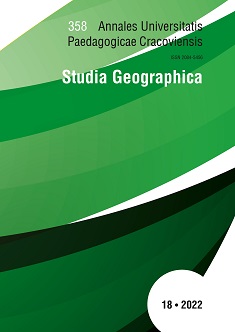Plogging – an ecotrend in recreation in the opinion of students
DOI:
https://doi.org/10.24917/20845456.18.8Abstract
Trends related to care for the environment, nature protection and promotion of ecological solutions in everyday life are also increasingly visible in tourism and recreation. One of the most popular among runners is plogging, which is a combination of running and collecting rubbish. There are more and more plogging events in the world and in Poland, and more and more local plogging groups are created in social media. An anonymous questionnaire was conducted among 158 students of Tourism and Recreation, the purpose of which was to find out the opinion on the state of knowledge of these students about plogging, popularity and usefulness in Poland, as well as to evaluate some of the behaviors of respondents related to caring for the environment. A small group of respondents had heard about the idea of plogging before. Most students find plogging a very good initiative, but a small minority of them would join to this type of activity. A significant number of them do not collect rubbish left by others, and blame the poor cleanliness of recreational areas, among others, on insufficient availability of litter bins and low level of public awareness.
References
Adamski, P., Ciapała, S. (2016). Turystyka przyrodnicza, ekoturystyka i turystyka zrównoważona – problemy klasyfikacyjne. Folia Turistica, 40/16, 9–26.
Badanie świadomości i zachowań ekologicznych mieszkańców Polski, Raport TNS Polska dla Ministerstwa Środowiska. Warszawa 2012.
Czym jest zero waste? – kolejna moda? Czy działanie na rzecz środowiska? https://zero‑waste.pl [dostęp: 02.02. 2022].
Dębski, M., Borkowska‑Niszczota, M. (2020). Ekologiczne zachowania konsumpcyjne i stosunek do proekologicznych działań w obiektach noclegowych przedstawicieli pokolenia Z. Turyzm, 2, 45–53.
Frączkiewicz, M. (2017). Śmieci modne, czyli wykorzystanie produktów ekologicznych i recyclingowych w modzie i designie. Studia Etnologiczne i Antropologiczne, 17, 127–145. Gipara recykling. https://giparawear.com/page/gipara‑recycling [dostęp: 01. 02.
.
Gralak, K., Kacprzak, M. (2021). Trendy i kierunki rozwoju agroturystyki w kontekście ekonomii doświadczeń. Warszawa: Wydawnictwo SGGW.
Kamińska, M. (2017). Gospodarka współdzielenia w Polsce – rezygnacja z posiadania na rzecz konsumpcji opartej na dostępie. Quarterly Journal, 3 (22), 165–177.
Klepacka‑Dunajko, I., Kałuża, H. (2015). Agro‑ekoturystyka zielarska przykładem markowego produktu turystycznego w Polsce. Europa Regionum, 24, 21–28.
Kłos, L. (2015). Świadomość ekologiczna Polaków – przegląd badań. Studia i Prace WNEIZ US, 42/2, 35–44.
Kocot, A. (2021). Wiedza ekologiczna dzieci w wieku wczesnoszkolnym. V Międzynarodowa konferencja naukowo‑praktyczna: Kształcenie i kształtowanie konkurencyjności profesjonalistów w warunkach integracji europejskiej. Ukraina, Mukaczewo
–22 maja 2021.
Korst, A. (2012). The Zero‑Waste Lifestyle: Live Well by Throwing Away Less. Ten Speed Press USA.
Krupa, J. (2014). Działania proekologiczne w turystyce szansą na jej zrównoważony rozwój. Zeszyty naukowe. Turystyka i rekreacja, 1(13), 5–23.
Plogging. Ekologiczne bieganie. http://www.ekocentryczka.pl/2021/07/plogging‑ekologiczne‑bieganie.html [dostęp: 12. 12 2021]
Plogging – jak połączyć bieganie z dbaniem o środowisko? https://www.magazynbieganie.pl/plogging‑jak‑polaczyc‑bieganie‑z‑dbaniem‑o‑srodowisko/ [dostęp.: 13. 12.
.
PLogging Team: biegaMy dla czystej Polski! https://www.festiwalbiegowy.pl/biegajacy‑swiat/plogging‑team‑biegamy‑dla‑czystej‑polski [dostęp: 25. 01.2022].
Plogging – wejdź na nowy poziom joggingu! https://sklep.jack‑wolfskin.pl/blog/plogging [dostęp: 14. 01.2022].
Sofronov, B. (2018). Millennials: a new trend for the tourism industry. Annals of Spiru Haret University. Economic Series, 3, 109–122.
Sport i ekologia – czyli jak być aktywnym w stylu zero waste https://lifemanagerka.pl/2019/06/sport‑zero‑waste [dostęp: 12. 02. 2022].
Strumińska‑Doktór, A. (2006). Droga do świadomości ekologicznej. Studia Ecologiae et Bioethicae, 4, 427–438.
Śmiechowska, M., Newerli‑Guz J., Kąkol J. (2009). Journal of Research and Application in Agriculture Engineering, 54(4).
Wasyluk, P., Kucner, A. (2020). Wykorzystanie trendów w projektowaniu produktów i usług turystycznych na przykładzie Szlaku Kopernikowskiego. Turystyka Kulturowa, 1, 28–43.
Woś, B. (2009). Ekoturystyka szansą zrównoważonego rozwoju terenów wiejskich. Infrastruktura i Ekologia Terenów Wiejskich, 5, 115–122.
Żarczyńska‑Dobiesz, A., Chomątowska, B. (2014). Pokolenie „Z” na rynku pracy – wyzwania dla zarządzania zasobami ludzkimi. Prace Naukowe Uniwersytetu Ekonomicznego we Wrocławiu, 350, 405–415.
Żuryński, R. (2014). Organizacja wielkoformatowych imprez sportowych przy uwzględnieniu orientacji ekologistycznej. Nauki o Zarzadzaniu, 18, 111–125.
Downloads
Published
Issue
Section
License
The submission of a paper to be published is synonymous with an agreement to transfer the copyright free of charge from the author to the publisher. The author also agrees to permit the publisher to publish the paper in printed form, open access online form, digital library form and other digital platforms with which the publisher has or will have a publishing agreement. Furthermore, the author agrees to not limit the number of copies that may be printed or issued by the publisher. In the case of co-authored papers, it is assumed that the corresponding author is authorized to represent the remaining co-authors in this respect. Authors are requested to sign a copyright declaration.

